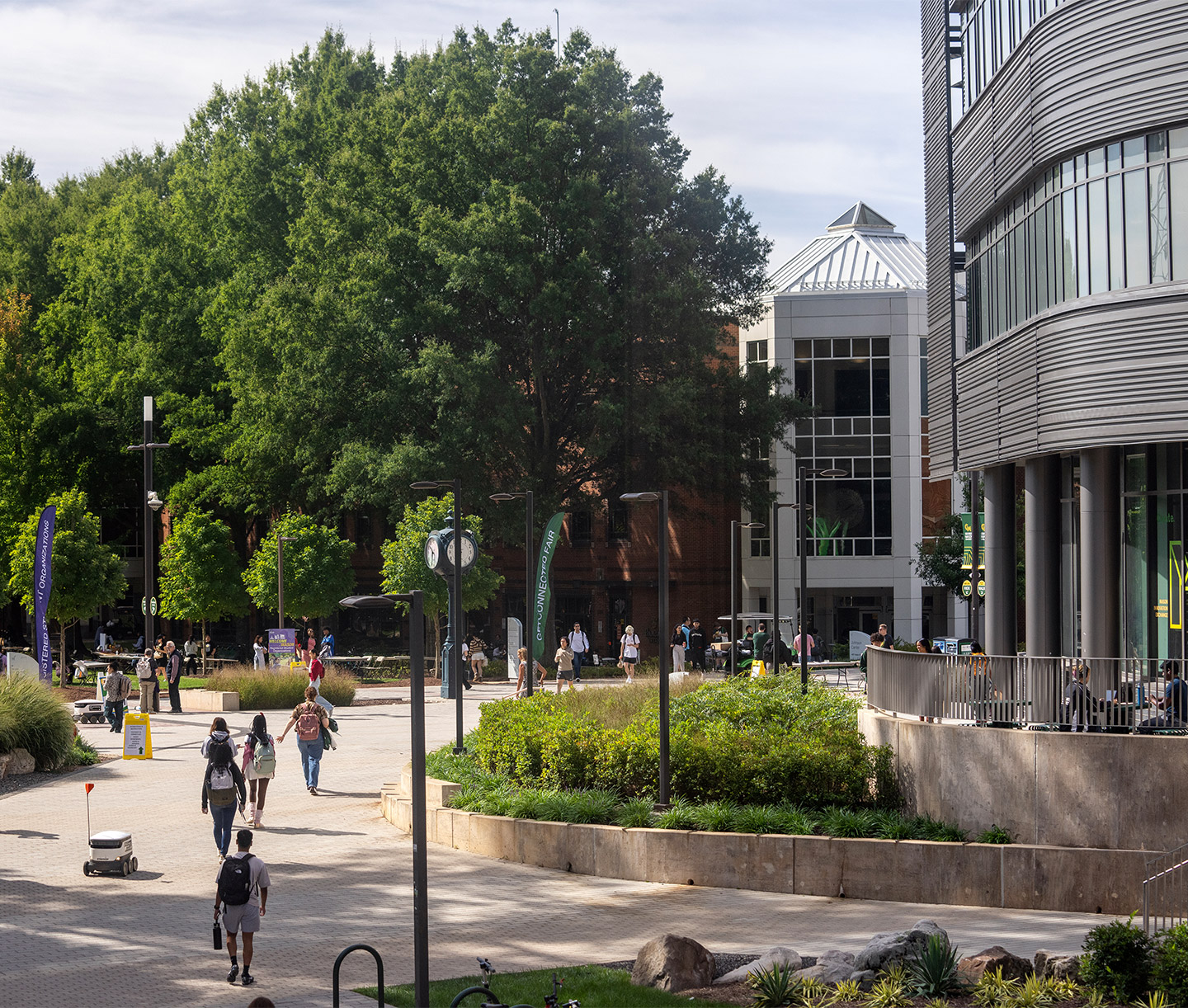Nursing (MSN)
Program Summary
100% Online
Duration: 2 years
Credits: 49 total
Cost Per Credit: $850
Degree: MSN-FNP
Accreditation: CCNE
College/School: College of Public Health
Next Start Date: 1/12/2026
Find Your Calling
Program Description
Provide holistic care to families across the health care continuum in our online Master of Science in Nursing with a Family Nurse Practitioner concentration (MSN–FNP).* The MSN program is accredited by the Commission on Collegiate Nursing Education (CCNE).**
Benefit from a responsive curriculum based on the most up-to-date evidence-based practice. Plus, learn from active practitioners who understand the demand of modern health care and can pass their real-world knowledge on to you.
The curriculum includes 500+ hours of learning in clinical settings. Equip yourself with the skills to build an evidence-based practice and integrate your learning into your everyday work.
#10 Best Master’s in Nursing Schools by U.S. News & World Report, 2024
Program Outcomes
When you complete our 49-credit MSN-FNP, you will be able to:
- Effectively communicate and collaborate with patients
- Perform a focused assessment of a patient across the lifespan
- Use patient and clinical data to formulate health care diagnoses
- Provide an evidence-based, patient-centered plan of care appropriate for individual patients
- Identify and evaluate appropriate therapeutic interventions for the management of individual patients
- Collaborate across health care disciplines with a foundation of interprofessional experience
- Address the social determinants of health in the care of patients and populations
This program also prepares you to sit for certifications from the American Nurses Credentialing Center (ANCC) and the American Academy of Nurse Practitioners (AANP).
Community-Focused, Evidence-Based
Population and public health are a core focus of this program. You will learn to work within community settings and gain an understanding of the complex nature of patients’ needs so you can develop an appropriate plan of care using a shared decision-making model.
Plus, as an R1 (Research 1) university, we help you develop an evidence-based practice informed by modern research. Learn to identify credible sources, review the latest journals and reports, and understand current research.
Combined with micro-level clinical skills, you’ll graduate with the comprehensive, responsive knowledge you need to ensure exceptional outcomes for your patients.
Direct Contact With Practicing Faculty
Many of our nurse practitioner faculty are active practitioners who will give you individual attention and support throughout this program. Learn directly from health care providers who have directed clinics, served diverse, low-income populations, and implemented and evaluated models of service for underserved communities and persons with chronic diseases.
Effective Collaboration Across Disciplines
To provide holistic care, modern practitioners need to collaborate with various health care providers, from nutritionists and social workers to psychologists and health informaticists. Mason weaves interprofessional experiences throughout your curriculum, so working across disciplines becomes second nature.
Our MSN curriculum is founded on Interprofessional Educational Collaborative Core Competencies, including putting patients’ needs first, respecting patients’ dignity and privacy, and cooperating with other care providers to create a climate of mutual respect.
Application Details
Who should apply?
The MSN–FNP is designed for nurses who want to provide top-quality care in a health care setting serving families and communities.
Applicants should have graduated from an accredited baccalaureate (BSN) program in nursing, have an active state-based/U.S. license as a registered nurse (RN), and documented experience as an RN.
Prerequisites
- Have a BSN degree from a regionally accredited institution with a minimum of 3.0 GPA
- Hold an active U.S. Registered Nursing license with documented work experience
- Have one year of experience as a registered nurse
- Have a current CPR card
Application Materials
- Graduate application
- Application fee
- Résumé
- Two letters of recommendation
- Personal statement
Ready to Apply?
All applicants should review the School of Nursing Graduate Admissions Standards. For international applicants, see guidelines for International Graduate Requirements.
What are the admissions recommendations?
- Completed online application
- $75 application fee
- Resume
- 2 Letters of Recommendation
- 3.0 undergraduate GPA (submit all undergraduate and graduate transcripts)
- GPA Addendum essay if undergrad GPA below 3.0
- BSN degree, active RN license, CPR certification, required course Statistics
*The master’s degree program in nursing at George Mason University is accredited by the Commission on Collegiate Nursing Education (http://www.ccneaccreditation.org)
Apply Now
This program accepts applications on a rolling basis and is currently accepting applications. Apply here or request more information if you have any questions. George Mason University is currently not considering applicants to the MSN-FNP program from the following states and territories*:
Arizona, Iowa, New Hampshire, New York, Oregon, Tennessee, Washington
*All states must be approved by their board of nursing. This list is updated as we get approval from the states board of nursing, so please check this site often.
**The MSN–FNP online graduate program is approved to confer a degree in most states in the U.S. but is awaiting full approval from select states. Please confirm your state’s approval status.
***The master’s degree program in nursing at George Mason University is accredited by the Commission on Collegiate Nursing Education
Career Opportunities
Driven by the health services demands of an aging population—including baby boomers living longer, more active lives—18 percent growth in health care occupations is projected by 2026.1 Advanced practice nursing positions are growing even faster, with a 31 percent increase projected.2
Family nurse practitioners are in demand, as health care facilities across the nation lack primary care providers and other critical medical staff. Rural areas are particularly underserved, with a ratio of one primary care provider for every 2,500 people.3 That amounts to 60 million people affected by this shortage.
Program Outcomes
When you complete our 49-credit MSN-FNP, you will be able to:
- Effectively communicate and collaborate with patients
- Perform a focused assessment of a patient across the lifespan
- Use patient and clinical data to formulate health care diagnoses
- Provide an evidence-based, patient-centered plan of care appropriate for individual patients
- Identify and evaluate appropriate therapeutic interventions for the management of individual patients
- Collaborate across health care disciplines with a foundation of interprofessional experience
- Address the social determinants of health in the care of patients and populations
This program also prepares you to sit for certifications from the American Nurses Credentialing Center (ANCC) and the American Academy of Nurse Practitioners (AANP).
Meet the Primary Care Demand
As an FNP with a master’s in nursing from George Mason University, you can meet this demand while joining a field with a median annual salary of $110,930.2 You will work collaboratively with other primary care providers, and independently, to help patients of all ages prevent disease, promote good health, and treat acute and chronic illnesses.
Launch a new practice in your community or work in an established facility, such as a home health organization, urgent care center, a hospital, or a residential treatment center.
Our Family Nurse Practitioner concentration prepares you to meet the needs of any community in a variety of settings. Graduate with a mix of clinical skills, research-informed insights on community and public health, and interprofessional experience so you can give your patients compassionate and holistic care.
Sources:
1 U.S. Bureau of Labor Statistics (2017 May). Healthcare occupations. Retrieved on April 12, 2019, from https://www.bls.gov/ooh/healthcare/home.htm.
2 U.S. Bureau of Labor Statistics (2017 May). Nurse anesthetists, nurse midwives, and nurse practitioners. Retrieved on April 12, 2019, from https://www.bls.gov/ooh/healthcare/nurse-anesthetists-nurse-midwives-and-nurse-practitioners.htm.
3 Slabach, B. (June 20, 2018). Fixing the medical staff shortage problem in rural areas. Becker’s Hospital Review. Retrieved on April 12, 2019, from https://www.beckershospitalreview.com/population-health/fixing-the-medical-staff-shortage-problem-in-rural-areas.html.
Courses
Program requirements for the online MSN–FNP are subject to change. Program requirements are subject to change; please refer to the University Catalog for the most up-to-date requirements.
MSN Core Courses
- NURS 665 – Theoretical and Ethical Foundations Related to Nursing | 3 credits
- GCH 500 – Foundations of Public Health | 3 credits
- NURS 715 – Nursing Informatics Inquiry | 3 credits
- NURS 757 – Nursing Research and Biostatistics I | 3 credits
- NURS 688 – Organization of Nursing and Health Care Delivery Systems | 3 credits
Level II Core Courses
- NURS 643 – Community-Oriented Primary Care | 3 credits
- NURS 713 – Decision Making and Pharmacologic Management in Practice | 3 credits
- NURS 714 – Health Assessment in Clinical Practice | 2 credits
- NURS 724 – Health Assessment Practicum | 1 credit
- NURS 761 – Pharmacotherapeutics | 3 credits
- NURS 769 – Physiology and Pathophysiology in Advanced Practice | 3 credits
Family Nurse Practitioner Concentration Courses
- NURS 738 – Family Primary Care I | 2 credits
- NURS 742 – Family Primary Care Practicum I | 2 credits
- NURS 739 – Family Primary Care II | 4 credits
- NURS 744 – Family Primary Care Practicum II | 4 credits
- NURS 741 – Family Primary Care III | 4 credits
- NURS 749 – Family Primary Care Practicum III | 4 credits
*Licensing requirements differ by state.
New to online learning? Visit our Online Learning Tips and Strategies page to learn more about what to expect and how to succeed in an online course at George Mason.
Tuition and Financial Aid
Tuition & Fees (2025–2026):
Tuition is $850 per credit hour. An additional charge of $35 per credit hour applies for a Distance Learning fee.
Financial Aid:
For information on loans and scholarships, visit the Office of Student Financial Aid. For information regarding grants, tuition waivers, and other merit aid, please inquire with your graduate department.
Study at the First and Only College of Public Health in Virginia
The College of Public Health at George Mason University is the first and only College of Public Health in Virginia and a national leader in inclusive, interprofessional, public health research, education, and practice. The College's transdisciplinary research seeks to understand the many factors that influence the public's health and well-being throughout the lifespan.
With more than 500 partners, the College serves the community through research, practice, and clinical care with a focus on the social determinants of health and health equity. Our graduates are uniquely prepared to thrive in an increasingly multi-cultural multidisciplinary, community-focused public health landscape.


- #10 Best Master’s in Nursing Schools by U.S. News & World Report, 20241
- #41 Best Online Master’s in Nursing Programs by U.S. News & World Report, 20251
- Financial aid programs and lifetime access to Mason’s Career Services
- Flexible online format designed to accommodate busy working students
- Actively practicing faculty with decades of experience and a curriculum informed by the latest research
- Accreditation of the MSN–FNP program by the Commission on Collegiate Nursing Education (CCNE)*
*The master’s degree program in nursing at George Mason University is accredited by the Commission on Collegiate Nursing Education
Sources
1 U.S. News and World Report. George Mason University Rankings. Retrieved January 23, 2025
Frequently Asked Questions
How long does it take to complete the program?
The part-time, online MSN–FNP is 49 credit hours and can be completed in 2–3 years.
Can I transfer credits from another University?
The transfer of up to nine semester hours in courses that directly correspond to those in the online MSN–FNP from another accredited college or university may be possible on a case-by-case basis. Transfer credit policies are Included in the University Catalog.
When are classes held?
MSN–FNP classes for part-time online students are offered in an asynchronous format, meaning they can be viewed interactively at your convenience. However, there may be opportunities for synchronous participation in some courses.
Where can I find course descriptions?
How much does the program cost?
Tuition is $850 per credit hour, plus a $35 distance learning fee per credit hour, for a full tuition cost of $43,365.
What tuition assistance is available?
Mason’s Office of Student Financial Aid provides information on potential scholarships and aid packages for the online MSN–FNP program.
How much does it cost to apply?
While there is a $75 application fee, there are multiple times throughout the year when the fee may be waived.
How do I receive additional information?
For answers to any additional questions, complete a request for information form or call us directly at 703-348-5006.
What are the admissions recommendations?
- Completed online application
- $75 application fee
- Resume
- 2 Letters of Recommendation
- Statement of Purpose essay
- 3.0 undergraduate GPA (submit all undergraduate and graduate transcripts)
- GPA Addendum essay if undergrad GPA below 3.0
- BSN degree, active RN license, CPR certification, required course Statistics
What are the credit requirements?
Requirements: 49 total credits
- 15 credits MSN core courses
- 34 credits advanced practice curriculum courses
Courses for George Mason University’s online MSN–FNP are offered in a convenient, part-time online format.
Students will also complete a hands-on clinical practicum offering real-world experience. The online curriculum mirrors George Mason’s on-campus program.
Virtual Open House
The George Mason University faculty dedicates time throughout the year to hold interactive sessions online for those who want to learn more about the programs we offer. If you would like to know what to expect from an online MSN with a Family Nurse Practitioner concentration, watch our pre-recorded Virtual Open House at your convenience. For information on upcoming sessions, please don’t hesitate to contact us.
Learn More

Accreditation
The MSN–FNP program at Mason Online is accredited by the Commission on Collegiate Nursing Education (CCNE).*
George Mason is accredited by the Commission on Colleges of the Southern Association of Colleges and Schools to award bachelor’s, master’s, and doctoral degrees
* The master’s degree program in nursing at George Mason University is accredited by the Commission on Collegiate Nursing Education
Contact
If you are unable to find the answers to your questions, submit a Request For Information form or contact our admissions representative via the contact information below.
Phone: 844-851-0923

Web Page Disclosure
Risepoint maintains this web page in cooperation with George Mason University. George Mason University maintains responsibility for curriculum, teaching, admissions, tuition, financial aid, accreditation, and all other academic- and instruction-related functions and decisions. Learn more about Risepoint.
Learn more about how to file a complaint.

